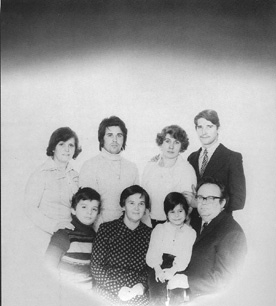Family Nest (Bela Tarr, 1977)
 Family
Nest, director Bela Tarrís realistic first feature (astonishingly made
when the director was 22) about the 1970s Hungarian housing crisis opens with
the quote: ďThis is a true story. It didnít happen to people in the film,
but it could have.Ē Considering the proliferation of non-professional actors
in this movie, that statement probably isnít too far from the truth. In a
departure from the intensely stylized, heavily choreographed camerawork that
dominated his later masterpieces made after Damnation,
he shoots Family Nest in a verite
style with direct, environmental sound, location shooting, and editing thatís
a bit too rough to be artful. As such, itís a film thatís way more
conventional than Tarrís later works, and not nearly as visually satisfying.
The outlook of life here is so unrelentingly bleak that at one point when Tarr
inserts a carefree montage at a local carnival that plays out with the
accompaniment of pop music feels wholly out of place until Tarr concludes the
sequence with a close-up of a character vomiting, a shock stunt that puts thing
back on track. As in nearly all of Tarrís films, the dingy barroom is only
escape from dingy houses that the characters live in, and alcoholism seems the
inevitable reprieve from their miserable lives.
Family
Nest, director Bela Tarrís realistic first feature (astonishingly made
when the director was 22) about the 1970s Hungarian housing crisis opens with
the quote: ďThis is a true story. It didnít happen to people in the film,
but it could have.Ē Considering the proliferation of non-professional actors
in this movie, that statement probably isnít too far from the truth. In a
departure from the intensely stylized, heavily choreographed camerawork that
dominated his later masterpieces made after Damnation,
he shoots Family Nest in a verite
style with direct, environmental sound, location shooting, and editing thatís
a bit too rough to be artful. As such, itís a film thatís way more
conventional than Tarrís later works, and not nearly as visually satisfying.
The outlook of life here is so unrelentingly bleak that at one point when Tarr
inserts a carefree montage at a local carnival that plays out with the
accompaniment of pop music feels wholly out of place until Tarr concludes the
sequence with a close-up of a character vomiting, a shock stunt that puts thing
back on track. As in nearly all of Tarrís films, the dingy barroom is only
escape from dingy houses that the characters live in, and alcoholism seems the
inevitable reprieve from their miserable lives.
 The political mess that is
Hungary during the Ď70s is represented in the microcosmic situation that the
extended family at the center of the film faces. The external struggles of
communism are combined with a home life filled with overbearing fascism, borne
out of frustration with the ramshackle, tight-knit living conditions. Ceaseless
political messages stream off the television courtesy of government sponsored
news programs, and the din is worsened by the thin walls and close quarters of
the apartment which makes it impossible to shut out. The examined family
contains a mother, a father, two twentysomething sons, a daughter-in-law, and
her daughter, and the film opens with the return of one of the sons from his
extended stint in the military. Due to financial strain and governmental red
tape in the housing dispersion process, all of the family lives under one very
small roof. Itís a desperate and explosive situation in which nerves are shot
and tensions frequently rise among the family members, and it becomes incredibly
shocking to find out that the young coupleís two years of waiting for a flat
of their own have only gotten them in a position where they need to wait two
more years for one.
The political mess that is
Hungary during the Ď70s is represented in the microcosmic situation that the
extended family at the center of the film faces. The external struggles of
communism are combined with a home life filled with overbearing fascism, borne
out of frustration with the ramshackle, tight-knit living conditions. Ceaseless
political messages stream off the television courtesy of government sponsored
news programs, and the din is worsened by the thin walls and close quarters of
the apartment which makes it impossible to shut out. The examined family
contains a mother, a father, two twentysomething sons, a daughter-in-law, and
her daughter, and the film opens with the return of one of the sons from his
extended stint in the military. Due to financial strain and governmental red
tape in the housing dispersion process, all of the family lives under one very
small roof. Itís a desperate and explosive situation in which nerves are shot
and tensions frequently rise among the family members, and it becomes incredibly
shocking to find out that the young coupleís two years of waiting for a flat
of their own have only gotten them in a position where they need to wait two
more years for one.
 They realize the futility of
their struggle against beauracracy, but have nothing to do but struggle against
it, and in Tarrís committed portrayal of their pathetic fight, his
political rage becomes acutely felt. One gets the impression that Tarr is
clearly outraged by the entire system and hopes that his film will cause enough
rage in the viewer to upset it. Still, the filmís dialectical process is far
too simple for its own good and disarms much of its hard won realism. After Tarr
shows scenes in which the familyís overbearing patriarch reprimands his
offspring for patronizing the local bar and committing adultery, he cuts to a
scene where he shows the father engaging in these same activities. Despite any
moralistic weaknesses, however, the audience is made acutely aware of the
strains placed on those in this situation. The daughter-in-law, desperate to
leave, has an astonishingly acted scene at the housing office that has her
begging, being abrasive to, and appealing to the reason of the employee who
controls her apartments applicationís fate, all to no avail. The series of
compromises presented here results in a broken system that practically asks
people to squat in living spaces that the government hasnít yet gotten around
to assigning because the red tape required to get a home legally is so tangled.
The final non-narrative interviews of the husband and wife, conducted
separately, are heartbreaking, first and foremost because they show them
confessing their disappointment and breaking down in tears for the first time
separately, and not as a couple. Itís horrible to realize that after being
together for seven years, theyíve moved toward none of their goals as a couple
because of the pressure of the system, and as both clearly state that they
believe a flat of their own would allow their relationship to begin improving,
the dire situationís impossibility only becomes more pronounced.
They realize the futility of
their struggle against beauracracy, but have nothing to do but struggle against
it, and in Tarrís committed portrayal of their pathetic fight, his
political rage becomes acutely felt. One gets the impression that Tarr is
clearly outraged by the entire system and hopes that his film will cause enough
rage in the viewer to upset it. Still, the filmís dialectical process is far
too simple for its own good and disarms much of its hard won realism. After Tarr
shows scenes in which the familyís overbearing patriarch reprimands his
offspring for patronizing the local bar and committing adultery, he cuts to a
scene where he shows the father engaging in these same activities. Despite any
moralistic weaknesses, however, the audience is made acutely aware of the
strains placed on those in this situation. The daughter-in-law, desperate to
leave, has an astonishingly acted scene at the housing office that has her
begging, being abrasive to, and appealing to the reason of the employee who
controls her apartments applicationís fate, all to no avail. The series of
compromises presented here results in a broken system that practically asks
people to squat in living spaces that the government hasnít yet gotten around
to assigning because the red tape required to get a home legally is so tangled.
The final non-narrative interviews of the husband and wife, conducted
separately, are heartbreaking, first and foremost because they show them
confessing their disappointment and breaking down in tears for the first time
separately, and not as a couple. Itís horrible to realize that after being
together for seven years, theyíve moved toward none of their goals as a couple
because of the pressure of the system, and as both clearly state that they
believe a flat of their own would allow their relationship to begin improving,
the dire situationís impossibility only becomes more pronounced.
* * *
02-21-03
Jeremy Heilman